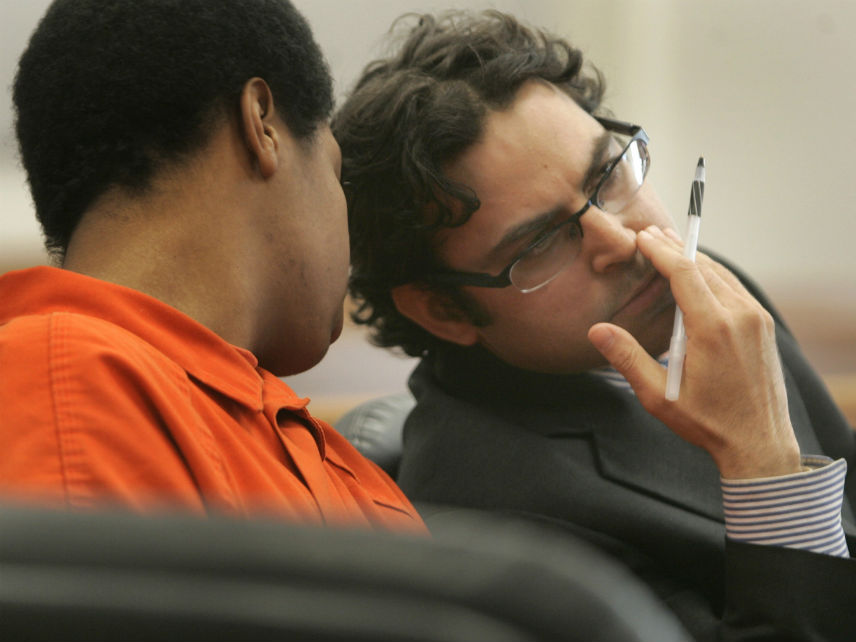ACLU Sues Nevada Over Inadequate Public Defender System
- OurStudio

- Nov 2, 2017
- 4 min read

David Pulliam/MCT/Newscom
Nevada's public defender system leaves lawyers underpaid and rural defendants underrepresented, according to a federal class-action lawsuit filed today by the American Civil Liberties Union (ACLU) of Nevada.
In a lawsuit arguing Nevada has abandoned its Sixth Amendment duty to provide meaningful legal representation to poor defendants, the Nevada ACLU writes that the state's public defender system is "plagued with serious structural deficiencies that have created a patchwork approach to indigent representation and rendered access to justice a function of geography."
The suit is the ACLU's eighth ongoing legal challenge to what criminal justice advocates say is a national epidemic of underfunded and inadequate public defender systems. The ACLU has also filed Sixth Amendment lawsuits challenging public defender systems in California, Washington, Idaho, Pennsylvania, Missouri, Louisiana, and Utah.
In Nevada, the ACLU says rural counties, which lack state-run public defender offices and instead rely on private contract attorneys, who are paid a flat fee. This flat-fee system, the suit argues, disincentivizes defense lawyers from doing more than the bare minimum of work. They're not reimbursed for travel and have to petition for extra funds to hire investigators or outside experts, which still may be denied.
The result, as detailed in several of the plaintiffs' cases, is that poor defendants lack adequate access to legal counsel at every stage of trial. They're stuck with high bails, leaving them in jail for months; they have little to no access to a lawyer before trial; and they're often urged to take plea deals by attorneys who may have barely skimmed their case, much less hired an investigator or tracked down witnesses.
"We have thousands of Nevadans who live in these rural counties and can't afford to hire an attorney if they're charged with a crime," says Amy Rose, the legal director of the Nevada ACLU. "At the end of the day they just don't have a fair chance of fighting the government's charges against them. This is a real issue that's been going on for a decade. The state is well aware of these problems, and they haven't taken any action to fix it."
The suit alleges that there are no standards or guidelines for contract attorneys in rural Nevada counties. They're appointed by a board of local officials, none of whom may be legal professionals. In Churchill County, Nevada, the only law practitioner on the board that appoints contracted public defenders is the district attorney, a system that essentially allows prosecutors to choose their opponent.
The lawsuit notes that in Churchill County, 364 indigent defense cases were assigned to one contract-appointed attorney during fiscal year 2016. Only four went to trial.
"The rarity of trials means that appointed attorneys cannot credibly threaten to hold the prosecution to its burden of proof," the suit says. "As a result, clients are pressured to accept pleas that do not reflect the merits of their cases."
One of the suit's plaintiffs, Nevada resident Jason Lee Enox, did not see his first contract attorney—hired by Churchill County—until a month after his arraignment on multiple charges of trafficking and drug possession. His attorney eventually withdrew from the case after being chastised in court by the judge for showing up unprepared.
According to the suit, Enox got a new flat-fee attorney, but he only met him a handful of times and the lawyer refused to return his calls or hire an investigator. With his trial looming, and facing a life sentence, Enox took what's known as an Alford plea this September—a type of guilty plea where the defendant maintains his innocence but admits that the evidence against him is likely too strong to overcome at trial.
In the meantime, Enox had been jail for more than a year. He lost his job, his house was demolished as a result of a property dispute he couldn't fight, and he was unable to attend his father's funeral.
Although the Supreme Court declared a constitutional right to a lawyer in its landmark 1963 decision Gideon v. Wainwright, states have undercut the Gideon guarantee by chronically underfunding public defender services.
In Missouri, where the ACLU is also suing for Sixth Amendment violations, the state's 370 public defenders have a load of more than 80,000 cases a year. A 2014 study by the American Bar Association (ABA) found that in 97 percent of cases, Missouri public defenders failed to meet the ABA's recommended minimum hours to effectively represent their clients.
A similar class action lawsuit was filed in Louisiana this year, where public defender offices are so underfunded that, last year, 33 out of 42 of them started turning away cases or placing defendants on waiting lists. Their reasoning: What little legal assistance they could provide would be so ineffective as to violate defendants' constitutional rights anyway.
In addition to the end of flat-fee contracts, Rose says the Nevada ACLU would like to see uniform workload and training standards for public defenders. In 2007, a commision on indigent defense convened by the Nevada Supreme Court came to the same conclusion, but there's been no progress in the 10 years since.
"We've studied the problem enough," Rose says, "and we need to have some real action by the state to fix this issue."




Comments